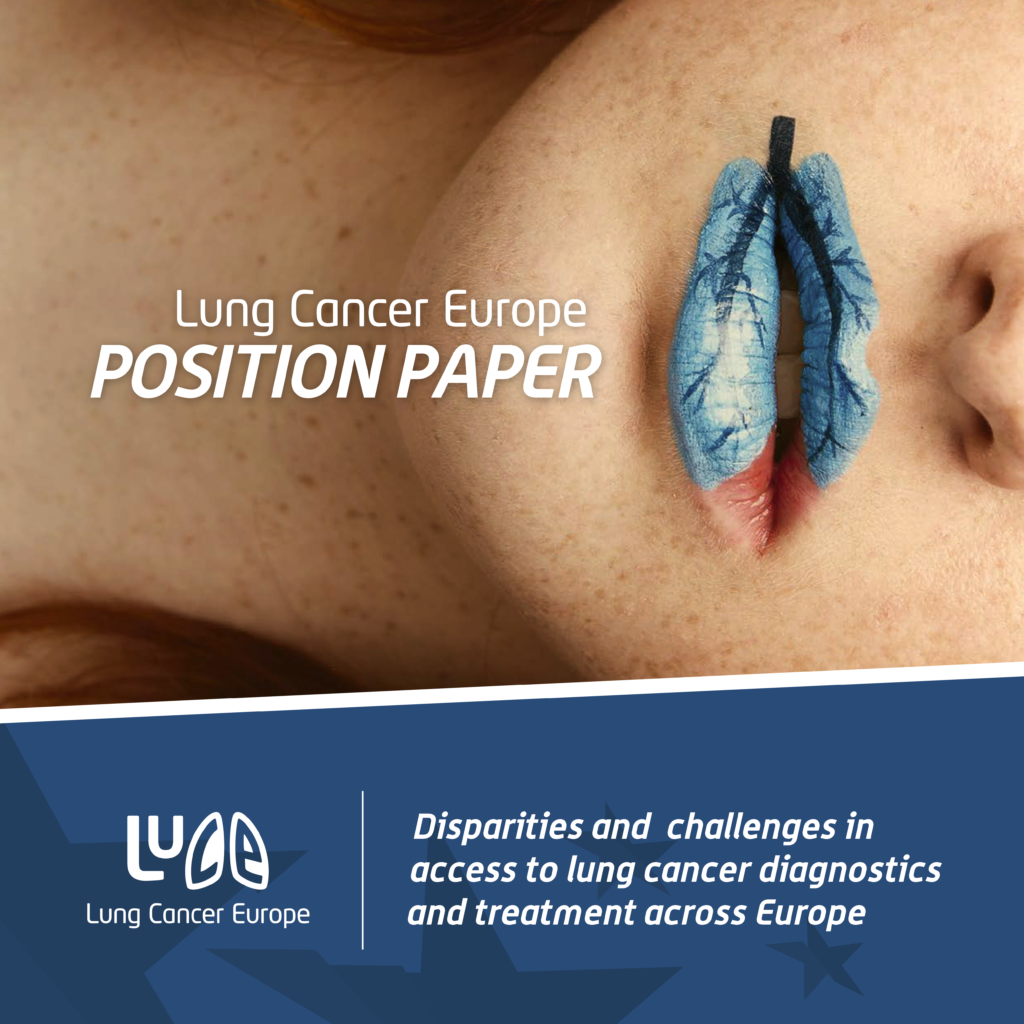-
+1 700 888 1234
-
Effingerstrasse 40 3008 Bern Switzerland

Lung cancer is responsible for nearly 1 in 5 cancer related deaths in Europe, yet it remains a cancer that is underfunded and underrepresented. Previous research has demonstrated that many people impacted by lung cancer face disparities in access to diagnostics, treatment and care.
To mark World Cancer Day, LuCE has released its latest position paper which identifies disparities and challenges in access to lung cancer diagnostics and treatment across Europe. Data were collected through 34 healthcare professionals/researchers, 16 pharmaceutical companies and LuCE members (patient organizations).
To mark World Cancer Day, LuCE has released its latest position paper which identifies disparities and challenges in access to lung cancer diagnostics and treatment across Europe. Data were collected through 34 healthcare professionals/researchers, 16 pharmaceutical companies and LuCE members (patient organizations).
Disparities and challenges in lung cancer diagnostics
Long wait-times in the lung cancer diagnostic pathway is a top challenge in most of European countries. 42% of European patients with lung cancer waited more than two months from their first medical consultation (specialist or primary care) to receiving their diagnosis. As Stefania Vallone, president of LuCE, highlights, `Speeding up the referral from primary care to specialist care is a priority and we also need to promote social awareness about lung cancer symptoms and risk factors´. Long wait-times accessing diagnostic tests such as EBUS-TBNA, CT-guided needle lung biopsy, PET-CT and molecular testing were evident.
Availability of molecular testing is key to selecting the best lung cancer treatment option but access to molecular testing differs across Europe. Eastern European citizens experience more restrictions in their opportunities to access these tests. There are remarkable differences between Western/Northern and Eastern Europe. Patients from Croatia, Romania, Poland, Latvia, Turkey and Spain do not have access to three or more recommended molecular tests, which may have a significant impact on the choice of treatment and outcome. LuCE also states that access to testing is not equal between centers even within countries and there is variable uptake of molecular testing in clinical practice.
Disparities and challenges in lung cancer treatment
Access to lung cancer treatment remains inequitable across Europe. In some Eastern European countries, most European Medicines Agency (EMA) approved drugs and their indications are not reimbursed or are available only at the full cost to patients. LuCE identified many restrictions in Latvia, Poland, Romania, Croatia, Turkey and Ireland. Patients from these countries do not have free access to, at least seven indications of lung cancer drugs as approved by the EMA. Additionally, there are significant access barriers in Portugal, Slovenia, Italy and Spain. In contrast, in countries like Finland, Germany, Israel, Sweden and the Netherlands, the majority of drugs are approved and reimbursed.
Disparities have been also found on access to radiotherapy. Some countries in Southern and Central-Eastern Europe have very limited access to radiotherapy, therefore there is a special need in these countries to expand and modernize their radiotherapy facilities.
Access to a clinical trial is a great treatment opportunity for many patients with lung cancer but opportunities to get involved depend on the number of trials conducted in the patients´ country. LuCE compared the number of open trials in 22 countries with national lung cancer prevalence and found tremendous disparities. As Stefania Vallone states `Patients from Israel, Switzerland, Denmark, Norway and the Netherlands have many more possibilities to access a lung cancer clinical trial than patients from Croatia, Turkey, Germany, Greece and Bulgaria. For example, while there is one trial per 69 patients with lung cancer in Israel, there is one per 1513 patients in Croatia´.
Call to action
Many disparities exist across Europe in terms of access to diagnostics, treatment and innovative therapies. This World Cancer Day, we launch a Call to Action to improve the outcomes for people impacted by this disease by calling for the implementation of multidisciplinary tumour boards; the standard use of broad panel molecular testing; develop lung cancer centers of excellence; harmonize HTA approaches across countries including the standardization of drug costs and time to reimbursement; and develop national guidelines on lung cancer across Europe.
`We must not forget that two million people die from lung cancer every year around the world, so we need solutions to offer the best diagnostics and treatments possible, in the quickest time possible. We want to join efforts to foster improvements in the reduction of disparities across Europe´, Stefania Vallone concludes.
Lung Cancer Europe
Lung Cancer Europe (LuCE) is the voice of people affected by lung cancer, striving to make lung cancer an EU health priority and supporting its members to be effective and sustainable organisations. LuCE provides a European platform for already existing lung cancer patient advocacy groups and supports the establishment of national lung cancer patient groups in different European countries where such groups do not yet exist.
Contact: [email protected] • www.lungcancereurope.eu
